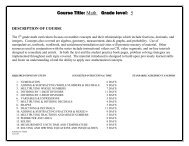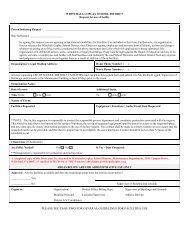Student Services Report - the Whitehall-Coplay School District!
Student Services Report - the Whitehall-Coplay School District!
Student Services Report - the Whitehall-Coplay School District!
You also want an ePaper? Increase the reach of your titles
YUMPU automatically turns print PDFs into web optimized ePapers that Google loves.
At <strong>the</strong> high school, counselors assist students in understanding and developing <strong>the</strong>ir personal<br />
strengths, interests and aptitudes. All of this information leads to <strong>the</strong> selection of a career<br />
pathway; integrating <strong>the</strong> student’s specific areas of interest. Elective choices and curricular<br />
choices are made based on <strong>the</strong> individual student’s academic and postsecondary goals and <strong>the</strong>ir<br />
individual achievement levels.<br />
Counselors provided developmentally appropriate career awareness. Career awareness is a<br />
focus at <strong>the</strong> elementary level. Initial skill development includes facing challenges, developing a<br />
work ethic, and moving toward becoming an independent and lifelong learner. Career<br />
awareness is addressed through <strong>the</strong> regular curriculum and through guidance classes.<br />
The middle school program takes a more indepth approach to career exploration. The focus<br />
includes developing an awareness of personal abilities, skills, interests, and motivations to<br />
achieve future career goals with success and satisfaction. <strong>Student</strong>s develop <strong>the</strong> skills to locate,<br />
evaluate, and interpret career information. All students are introduced to Career Cruising, a web<br />
based career exploration program.<br />
At <strong>the</strong> high school level, students focus on assessing and modifying <strong>the</strong>ir educational plans to<br />
support <strong>the</strong>ir career choices. Job readiness and employability skills are emphasized through,<br />
mentoring, shadowing, and o<strong>the</strong>r work experience programs. <strong>Student</strong>s begin to understand that<br />
<strong>the</strong> changing work place requires lifelong learning and new skills designed for <strong>the</strong> future. Every<br />
guidance counselor at <strong>the</strong> 11 th grade level meets individually with each student to discuss <strong>the</strong>ir<br />
career and or college plans.<br />
The counseling program in high school assists students in becoming responsible adults who can<br />
develop plans based upon selfunderstanding of needs, interests, and skills. Education and<br />
career plans are reviewed in accordance with students’ postgraduation educational and<br />
occupational goals.<br />
The high school counselors also assist teachers in coordinating career education learning units in<br />
<strong>the</strong> classroom. The high school counselors support <strong>the</strong> program through college and industry<br />
visitations, and through professional development.<br />
Total development of <strong>the</strong> student includes <strong>the</strong> ability to make appropriate postsecondary plans.<br />
Competencies are developed in areas of selfknowledge, career planning, and<br />
education/vocational development. Pupil services staff assists in accomplishing <strong>the</strong>se goals<br />
through individual or group counseling and instruction in <strong>the</strong> use of technologyassisted career<br />
exploration.<br />
Counselors provide both group and individual counseling. <strong>Student</strong>s are referred for small group<br />
counseling on an as needed basis. A teacher, parent, counselor, or administrator can refer<br />
students. Small group topics may include: coping skills, anger management skills, social skills,<br />
study skills, and children of divorce or separated parents. Group workshops are cofacilitated with<br />
counselors from The Center for Humanistic Change, Valley Youth House and Crime Victims<br />
Counsel.<br />
<strong>Student</strong>s receive individual counseling on an as need basis for a variety of reasons. Teachers,<br />
parents, counselors, administrators, or students <strong>the</strong>mselves may refer <strong>the</strong> student for services<br />
through <strong>the</strong> <strong>Student</strong> Assistance Program or <strong>the</strong> building referral process. Individual topics may<br />
include: coping strategies, peer relationships and conflict resolution, effective social skills,<br />
depression and anxiety, substance abuse education, school adjustment, decisionmaking skills,<br />
divorce, eating and body image concerns, individual/family/school crisis intervention, and<br />
communication skills.







